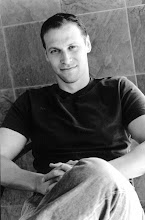In the panoply of sources that give rise to book complaint—blog entries, overheard bookstore conversations, friends’ bitching—I’ve noted a particular grievance that gets what I believe is unnecessary air time. Readers feel that the fix is in when an author who is mentioned in the acknowledgements also offers a blurb for the same book. (Complaining about blurb corruption reminds me of a popular joke among professors: “Why are academic squabbles so fierce? Because the stakes are so low.”)
This makes little sense to me (blurb complaining, not academic squabbles). I’ve always taken blurbing quite seriously, rejecting far more books than I’ve blurbed. In fact, I’ve only given a handful over the past few years: Blake Crouch’s Desert Places, Steven Sidor’s Skin River, Harley Jane Kozak’s Dating Dead Men—though neither Harley nor I can remember the blurb since it wasn’t used on the book jacket (we seem to recall this was because her editor felt her mysteries were tamer than my own, but we’re both out to lunch half the time so maybe I didn’t even actually blurb her)—Lee Goldberg for his Diagnosis Murder Series, and Gayle Lynds’s The Coil. Now. In an upcoming book which I’ve elected to blurb, I’m also mentioned favorably in the acknowledgments since I read the manuscript at a very early phase and shepherded the author along through edits, pairing with a lawyer/agent, and an eventual two book deal. My question is: If I believe that strongly in a novel, why WOULDN’T I blurb it also? It’s not some sort of blurb cronyism. It’s the last step in using whatever moderate influence I’ve acquired to endorse a book I believe should be read.
No matter how much talent you have, to make it in publishing, you always need the right help from the right people at the right time. Call it luck, call it fate, call it whatever you please, but though hard work and talent are a necessity (usually), few novelists I’ve met have gotten by on these alone. I caught some breaks early in my career, and I’m always grateful to those who read my work early and took a gamble, putting in their time and making use of their contacts for me. Though writing is fiercely independent, I do see a responsibility to give back to the community, to pass along the good karma that I’ve been fortunate enough to receive. I don’t give back to the writing community by telling author who need improvement that their books are fantastic, and I don’t give back to the reading community by endorsing crap.
I was privy to a conversation a few months ago between two talented gay writers who said they’ve had a hard time getting blurbs from straight authors for their books, because the straight authors are afraid they’ll lose readers over it, or that they’ll somehow be tainted by the association. What a shame. I blurb books strictly on the basis of what I like and what I believe merits commendation. And I do not solely blurb books that fall within the domain of what I believe my readership likes (I’m quite certain that my assumptions about my readers’ tastes are wrong anyways). Lee Goldberg’s Diagnosis Murder series, for instance, may not be the best match for Navy SEALs readers I acquired from MINUTES TO BURN, but guess what? The books say Diagnosis Murder on them. If one of my gritty tough-guy readers is dumb enough to buy Lee’s book thinking that it’ll be filled with demolition explosives and graphic violence, that’s his own problem. Lee is a talented writer who nailed the books he was writing. He accomplished what he set out to do and did a damn fine job of it. If a book’s tone or style is less clear and I have some concern that readers might buy it off my blurb not knowing what they’re getting into, I’ll make clear what the book is about in the blurb: “A touching series of lesbian vampire haiku…” Mike Connelly did this for me in DO NO HARM, making clear it was a medical thriller: “Hurwitz has put together a medical/psychological detective story that sticks in the mind long after the last page is turned.” A great endorsement, sure, but it also ensures that if one of his readers gets nauseas in hospitals, they’ll steer clear.
How each author decides to blurb is his or her own business and to be sure, a fair amount of bullshit clouds the endorsement picture, but please bear in mind: an acknowledgment in addition to a blurb may just mean that the author really liked the book and wanted to see it succeed in more ways than one.
Thursday, February 17, 2005
Subscribe to:
Post Comments (Atom)

2 comments:
Great blog entry, Gregg. When it comes to picking up a novel, I pick it up on the storyline and the author. I, rarely, judge a book by its blurbs. I read them afterwards, though.
The late Jack Olsen, in the last years of his life, wrote diatribes against the "tragic state of true crime writing," insisting that the genre was now ruled by hacks and pornographers with no journalistic sensibilities. As a true crime author mentored by Jack Olsen, I called him one day and said "Jack, the next time you do one of your rants, could you please be so kind as to at least say, `except for Burl Barer?'"
His reply shamed me:"Burl, I already did. Haven't you looked at the cover of your most recent book?"
His blurb, in red letters across the top of my latest true crime paperback, said "Barer writes true crime at its best!"
Oooops.
Its been a while since anyone has asked me to blurb a book, but I chalk that up to superstition. I blurbed the most recent mystery in an ongoing series -- and the series was promptly cancelled by the publisher. That is corrolation, not causation. Honest.
Post a Comment